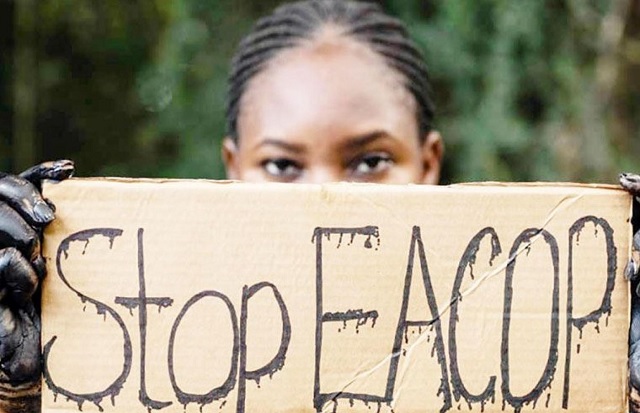
Kampala, Uganda | THE INDEPENDENT | The stop EACOP campaigners are now targeting Chinese banks and insurance firms from funding the longest crude oil pipeline between Uganda and Tanzania.
The latest move by the international and their local campaigners comes after they successfully fought off Western banks and insurance firms from funding the project that will transport crude oil from the Albertine Graben in Uganda to the port of Tanga in Tanzania.
There have been reports that Chinese leaders are to cover the $1.8 billion needed to cover the entire cost of the pipeline. Engineer Irene Batebe, the Energy and Mineral Development Ministry’s permanent secretary was last month quoted by local and international media saying that negotiations with the Chinese financiers to the debt component of financing the pipeline were expected to be concluded this month.
The confirmation by Batebe came after it emerged that TotalEnergies, the lead investor in EACOP had signed a deal with China Petroleum Pipeline Engineering (CPP) to supply the pipeline and construction of the EACOP project.
Those developments have intensified the #StopEACOP campaigners to divert their strategies from the West to the East as the government of Uganda equally shifted the development of some of its oil and gas infrastructure to the Eastern Friends, particularly China.
In one of the documents that URN has seen, the campaigners through the newly formed EACOP-affected people’s network and the African Institute for Energy Governance (AFIEGO) collected signatures from over two thousand residents from Hoima, Bulisa, Kikuube, and other districts as part of the petition to the China Export and Credit Insurance Corporation (Sinosure) and the Export-Import Bank of China (China Exim Bank). They said households have expressed concerns over news that Sinosure and China ExIm Bank are set to provide financial support to the EACOP project.
Sinosure and China Exim Bank in the letter are asked to conduct an independent field visit organised in collaboration with the affected communities before making any decision related to the EACOP.
“It will be recalled that in September 2023, Ms. Irene Bateebe, the Permanent Secretary of Uganda’s Ministry of Energy and Mineral Development (MEMD) was quoted as saying that the Exim Bank of China and Sinosure were set to provide over half of the $3 billion EACOP project loan,” reads part of the letter.
The campaigners who including East African Crude Oil Pipeline Affected People’s Network (EACOP-N) said that the EACOP, Kingfisher, and Tilenga oil project developers are displacing 13,546 households in Uganda and Tanzania with over 86,000 people.
They claimed that the displacements have been characterized by violations against Uganda’s 1995 Constitution and International Finance Corporation Performance Standards and have caused impacts such as food stress, income losses, and school dropouts.
The letter further states that the people observed that on Lake Albert where CNOOC’s Kingfisher oil project activities are located in Uganda, some fisherfolk have lost access to fishing grounds
. “In addition, the light from the Kingfisher oil rig that was launched in January 2023 has made access to fish more difficult. Due to the above factors, fisherfolk have been pushed to fishing on the part of Lake Albert that is found in the Democratic Republic of Congo (DRC), where the fishermen face insecurity,” they said. Some of the issues raised in the letter had not been highlighted in the previous campaigns targeting the Western funders.
The government has refuted such claims even when there have been some delays in resettling some of the Project-Affected Persons(PAPs) especially those that opted that houses be built for them. In August, URN requested the Petroleum Authority to provide updated data about the resettlement of the EACOP Project Affected Persons, Kingfisher Development, and the Tilenga Development.
According to the Authority, the acquisition of land for the Kingfisher development area’s three Resettlement Action Plans (RAPs) was concluded at 100%). It indicated that the total land requirement for CNOOC’s Kingfisher is approximately 1,020 acres with 727 Project Affected Persons (PAPs). Sixty-five (65) resettlement houses were constructed and handed over to the owners under CNOOC’s Resettlement Action Plans.
Under the Tilenga project, PAU indicated that the total land requirement for the Tilenga Project is approximately 2,901 acres. It indicated that the land acquisition process for the Tilenga project stood at 97% with approximately 5,412 out 5,523 PAPs fully compensated with 143 resettlement houses handed over. Fifteen houses were ready to be handed over and 77 were under construction.
Under the East African Crude Oil pipeline (EACOP), PAU revealed that the total land take for the project will be 2,740 acres. At the time, compensation stood at 84%. Three thousand and sixty-two out of three thousand six hundred and sixty-five (3,656) PAPs had received their compensation a total of 177 resettlement houses handed over to the respective owners.
The Authority indicated that the compensation process and handling of cultural sites, and graves or any burial or cultural sites affected by the project footprint was being compensated in kind and relocated by the project, in line with the norms and customs of the affected persons.
*****
URN
 The Independent Uganda: You get the Truth we Pay the Price
The Independent Uganda: You get the Truth we Pay the Price



